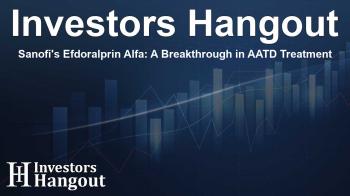Sanofi's Efdoralprin Alfa: A Breakthrough in AATD Treatment

Sanofi's Efdoralprin Alfa: Advances in Alpha-1 Antitrypsin Deficiency
Sanofi is making significant strides with efdoralprin alfa, a therapy that has shown great promise in treating alpha-1 antitrypsin deficiency (AATD) emphysema. In recent clinical trials, efdoralprin alfa successfully met all primary and key secondary endpoints, highlighting its potential as a revolutionary treatment option.
Results from the ElevAATe Phase 2 Study
The results of the global ElevAATe phase 2 study showcased that efdoralprin alfa, an investigational recombinant human alpha-1 antitrypsin-Fc fusion protein, can deliver improved therapeutic outcomes compared to standard plasma-derived therapies. Notably, in adults suffering from AATD emphysema, efdoralprin alf demonstrated superiority in both dosing regimens—every three weeks (Q3W) and four weeks (Q4W)—indicating a significant advancement in treatment convenience.
Statistical Significance of Efdoralprin Alfa
Data revealed that participants receiving efdoralprin alfa experienced a meaningful increase in functional AAT levels, vital for lung protection. The study not only achieved its primary endpoint—with notably reduced dosing frequency—but also met crucial secondary endpoints, confirming the efficacy of efdoralprin alfa as a potential new standard for AATD treatment.
Safety and Tolerability
Safety profiles for efdoralprin alfa were comparable to those of plasma-derived therapies, suggesting that patients may benefit from its utilization without additional safety concerns. Further safety evaluations will continue in ongoing follow-up studies.
Insights from Clinical Experts
Leading figures in respiratory medicine have expressed optimism about the implications these findings may hold for the AATD community. Christopher Corsico, Sanofi's Global Head of Development, remarked on the importance of achieving higher functional AAT levels with less frequent dosing. This innovation may significantly alter the current treatment landscape, which relies heavily on weekly infusions of plasma-derived therapies.
Igor Barjaktarevic, MD, PhD, highlighted the challenges faced by AATD patients. He emphasized the need for treatment options that allow stable AAT levels without dependence on blood donation programs. The meaningful results observed in the ElevAATe study could change the way AATD is managed, meeting a previously unfulfilled need among patients.
The Implications of AATD
AATD is a rare inherited disorder characterized by insufficient levels of AAT, a protein crucial for protecting lungs from damage. Despite the introduction of plasma-derived therapies since 1987, new treatment options have been scarce. It is estimated that approximately 235,000 individuals are affected by AATD worldwide, and alarmingly, a significant portion remains undiagnosed. This condition can lead to severe complications such as chronic obstructive pulmonary disease (COPD) and may necessitate lung transplantation in severe cases.
About Efdoralprin Alfa
Efdoralprin alfa (SAR447537, previously known as INBRX-101) is designed to act as a restorative therapy, aiming to elevate AAT levels to a normal range while mitigating the dangerous effects of neutrophil elastase, an enzyme that can damage lung tissue. With fast track and orphan drug designations granted by the FDA, Sanofi is committed to advancing this treatment through rigorous clinical evaluation.
Looking Ahead
As Sanofi prepares for future presentations of the ElevAATe study results at medical conferences, the company is also engaging with regulatory bodies to outline the next steps for efdoralprin alfa's development. The evolution of this therapy could represent a significant leap forward in the search for effective treatments for AATD emphysema.
Frequently Asked Questions
What is efdoralprin alfa?
Efdoralprin alfa is an investigational recombinant human alpha-1 antitrypsin-Fc fusion protein under development by Sanofi for treating AATD emphysema.
What were the main findings of the ElevAATe study?
The ElevAATe study demonstrated that efdoralprin alfa met all primary and key secondary endpoints, providing meaningful improvements in functional AAT levels with less frequent dosing compared to current therapies.
How does efdoralprin alfa compare to existing treatments?
Unlike existing plasma-derived therapies, which require weekly infusions, efdoralprin alfa may be administered every three or four weeks, offering enhanced convenience for patients.
What significance do the study results have for patients?
The study results suggest that efdoralprin alfa could become a vital treatment option that improves quality of life for patients living with AATD by providing stable AAT levels with reduced dosing frequency.
What additional studies will follow?
Further safety evaluations and clinical assessments will continue in ongoing studies to ensure comprehensive understanding of efdoralprin alfa's effects and long-term use in AATD patients.
About The Author
Contact Owen Jenkins privately here. Or send an email with ATTN: Owen Jenkins as the subject to contact@investorshangout.com.
About Investors Hangout
Investors Hangout is a leading online stock forum for financial discussion and learning, offering a wide range of free tools and resources. It draws in traders of all levels, who exchange market knowledge, investigate trading tactics, and keep an eye on industry developments in real time. Featuring financial articles, stock message boards, quotes, charts, company profiles, and live news updates. Through cooperative learning and a wealth of informational resources, it helps users from novices creating their first portfolios to experts honing their techniques. Join Investors Hangout today: https://investorshangout.com/
The content of this article is based on factual, publicly available information and does not represent legal, financial, or investment advice. Investors Hangout does not offer financial advice, and the author is not a licensed financial advisor. Consult a qualified advisor before making any financial or investment decisions based on this article. This article should not be considered advice to purchase, sell, or hold any securities or other investments. If any of the material provided here is inaccurate, please contact us for corrections.

